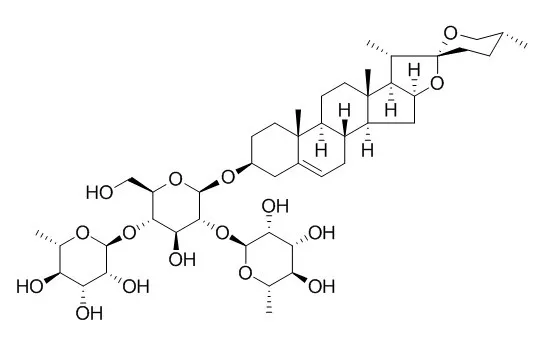| Cell Research: |
| Int J Mol Med. 2014 Nov;34(5):1401-8. | | Dioscin inhibits adipogenesis through the AMPK/MAPK pathway in 3T3-L1 cells and modulates fat accumulation in obese mice.[Pubmed: 25189808] | Dioscin (DS) is a steroidal saponin present in a number of medicinal plants and has been shown to exert anticancer, antifungal and antiviral effects. The present study aimed to deternube the effects DS on the regulation of adipogenesis and to elucidate the underlying mechanisms.
METHODS AND RESULTS:
In vitro experiments were performed using differentiating 3T3-L1 cells treated with various concentrations (0-4 μM) of DS for 6 days. A cell viability assay was performed on differentiating cells following exposure to DS. Oil Red O staining and triglyceride content assay were performed to evaluate the lipid accumulation in the cells. We also carried out the following experiments: i) flow cytometry for cell cycle analysis, ii) quantitative reverse transcription polymerase chain reaction for measuring adipogenesis-related gene expression, and iii) western blot analysis to measure the expression of adipogenesis transcription factors and AMP-activated protein kinase (AMPK), acetyl-CoA carboxylase (ACC) and mitogen-activated protein kinase (MAPK) phosphorylation. In vivo experiements were performed using mice with obesity induced by a high-fat diet (HFD) that were treated with or without DS for 7 weeks. DS suppressed lipid accumulation in the 3T3-L1 cells without affecting viability at a dose of up to 4 μM. It also delayed cell cycle progression 48 h after the initiation of adipogenesis. DS inhibited adipocyte differentiation by the downregulation of adipogenic transcription factors and attenuated the expression of adipogenesis-associated genes. In addition, it enhanced the phosphorylation of AMPK and its target molecule, ACC, during the differentiation of the cells. Moreover, the inhibition of adipogenesis by DS was mediated through the suppression of the phosphorylation of MAPKs, such as extracellular-regulated kinase 1/2 (ERK1/2) and p38, but not c-Jun-N-terminal kinase (JNK). DS significantly reduced weight gain in the mice with HFD-induced obesity; this was evident by the suppression of fat accumulation in the abdomen.
CONCLUSIONS:
The present study reveals an anti-adipogenic effect of DS in vitro and in vivo and highlights AMPK/MAPK signaling as targets for DS during adipogenesis. | | Toxicol Appl Pharmacol. 2014 Dec 1;281(2):166-73. | | Dioscin inhibits colon tumor growth and tumor angiogenesis through regulating VEGFR2 and AKT/MAPK signaling pathways.[Pubmed: 25111127] | Dioscin has shown cytotoxicity against cancer cells, but its in vivo effects and the mechanisms have not elucidated yet. The purpose of the current study was to assess the antitumor effects and the molecular mechanisms of Dioscin.
METHODS AND RESULTS:
We showed that Dioscin could inhibit tumor growth in vivo and has no toxicity at the test condition. The growth suppression was accompanied by obvious blood vessel decrease within solid tumors. We also found Dioscin treatment inhibited the proliferation of cancer and endothelial cell lines, and most sensitive to primary cultured human umbilical vein endothelial cells (HUVECs). What's more, analysis of HUVECs migration, invasion, and tube formation exhibited that Dioscin has significantly inhibitive effects to these actions. Further analysis of blood vessel formation in the matrigel plugs indicated that Dioscin could inhibit VEGF-induced blood vessel formation in vivo. We also identified that Dioscin could suppress the downstream protein kinases of VEGFR2, including Src, FAK, AKT and Erk1/2, accompanied by the increase of phosphorylated P38MAPK.
CONCLUSIONS:
The results potently suggest that Dioscin may be a potential anticancer drug, which efficiently inhibits angiogenesis induced by VEGFR2 signaling pathway as well as AKT/MAPK pathways. |
|
| Animal Research: |
| Arch Pharm Res. 2014 Oct;37(10):1336-44. | | Anti-hyperuricemic and nephroprotective effects of Rhizoma Dioscoreae septemlobae extracts and its main component dioscin via regulation of mOAT1, mURAT1 and mOCT2 in hypertensive mice.[Pubmed: 24866061 ] | Rhizoma Dioscoreae septemlobae (RDSE) has been widely used for the treatment of hyperuricemia in China. However, the therapeutic mechanism has been unknown.
METHODS AND RESULTS:
This study investigated the antihyperuricemic mechanisms of the extracts obtained from RDSE and its main component Dioscin (DIS) in hyperuricemic mice. Hyperuricemic mice were induced by potassium oxonate (250 mg/kg). RDSE or DIS was orally administered to hyperuricemic mice at dosages of 319.22, 638.43, 1276.86 mg/kg/day for 10 days, respectively. Uric acid or creatinine in serum and urine was determined by HPLC or HPLC-MS/MS, respectively. The xanthine oxidase (XO) activities in mice liver were examined in vitro. Protein levels of organic anion transporter 1 (mOAT1), urate transporter 1 (mURAT1) and organic cation transporter 2 (mOCT2) in the kidney were analyzed by western blotting. The results indicated that uric acid and creatinine in serum were significantly increased by potassium oxonate, as compared to that of control mice. Compared saline-treated group, after RDSE treatment in the high and middle dose, the expression of mOAT1 increased 47.98 and 54.48 %, respectively, which accompanied with the decreased expression of mURAT1 (47.63 %) in high dose. After DIS treatment in high, middle and low dose, the expression of mOAT1 increased 23.93, 32.80 and 25.28 % compared to saline-treated group, respectively, which accompanied with the decreased expression of mURAT1 (51.07, 51.42 and 51.35 %). However, RDSE and DIS displayed a weak XO inhibition activity compared with allopurinol.
CONCLUSIONS:
Therefore, RDSE and DIS processed uricosuric and nephroprotective actions by regulation of mOAT1, mURAT1 and mOCT2. |
|






 Cell. 2018 Jan 11;172(1-2):249-261.e12. doi: 10.1016/j.cell.2017.12.019.IF=36.216(2019)
Cell. 2018 Jan 11;172(1-2):249-261.e12. doi: 10.1016/j.cell.2017.12.019.IF=36.216(2019) Cell Metab. 2020 Mar 3;31(3):534-548.e5. doi: 10.1016/j.cmet.2020.01.002.IF=22.415(2019)
Cell Metab. 2020 Mar 3;31(3):534-548.e5. doi: 10.1016/j.cmet.2020.01.002.IF=22.415(2019) Mol Cell. 2017 Nov 16;68(4):673-685.e6. doi: 10.1016/j.molcel.2017.10.022.IF=14.548(2019)
Mol Cell. 2017 Nov 16;68(4):673-685.e6. doi: 10.1016/j.molcel.2017.10.022.IF=14.548(2019)